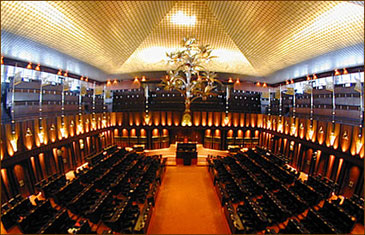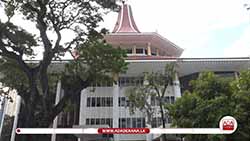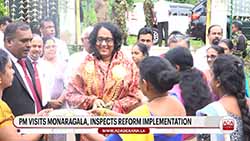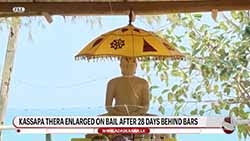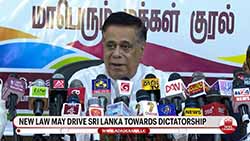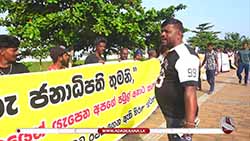Vote on impeachment to be held on Jan 11
January 7, 2013 12:54 pm
Party leaders today decided to hold the parliament debate on the impeachment motion against the Chief Justice on January 10 and 11 while the vote will be taken at 6.30pm on January 11.
The decision was taken during a special meeting between the leaders of political parties held today (07) at the Parliament premises.
However, it was reported that opposition party representatives had walked out of the Party Leaders’ meeting in protest over the Government’s refusal to accept the Supreme Court’s determination on the impeachment.
The Parliamentary Select Committee has no legal authority to inquire into allegations on the Chief Justice, the Appeal Court on Thursday (03) said reading out the Supreme Court interpretation of the Sri Lankan constitution.
This was stated when two petitions filed challenging the impeachment of Chief Justice Shirani Bandaranayaka were taken up at the Appeal Court.
The Appeal court further explained that allegations against a judge could only be investigated by an entity with judicial authority. If not the authority of the whole judiciary of the country could be threatened, the Court added.
The PSC was established under the standing order 78(A) and the aforementioned order is not a law, the Appeal Court observed.
Court hence stated that in order to inquire allegations the Chief Justice, Parliament needs to appoint and committee or an entity endowed with judicial authority.
Sri Lanka’s first female chief justice Shirani Bandaranayaka was found guilty on three counts on December 8 by a Parliamentary Select Committee.
“We have found her guilty of three charges out of the first five we have investigated,” Nimal Siripala de Silva, minister of irrigation and a member of the impeachment committee, told reporters on December 8.
He said the charges against Shirani Bandaranayake included financial irregularities, conflict of interest, and failure to declare her assets.
A lawyer for Bandaranayake said she had been framed, describing her as the victim of a “set-up job”.
Bandaranayake last year ruled against a bill proposing a budget of 80 billion rupees ($614 million) for development, saying it had to be approved by nine provincial councils.
The ruling angered the government and its backers, some of whom accused the judiciary of overstepping its authority.
Under impeachment proceedings launched last month, parliament speaker Chamal Rajapaksa, appointed a committee of 11 members, seven of them from the ruling party, to investigate 14 charges against Bandaranayake, ranging from not disclosing her wealth to professional misconduct.
The United States, the United Nations and the Commonwealth have raised concerns about the process and called on the government to ensure the independence of the judiciary.
The government which has more than a two-thirds majority, needs only 113 votes in the 225-member legislature to remove the chief justice from her post.
The decision was taken during a special meeting between the leaders of political parties held today (07) at the Parliament premises.
However, it was reported that opposition party representatives had walked out of the Party Leaders’ meeting in protest over the Government’s refusal to accept the Supreme Court’s determination on the impeachment.
The Parliamentary Select Committee has no legal authority to inquire into allegations on the Chief Justice, the Appeal Court on Thursday (03) said reading out the Supreme Court interpretation of the Sri Lankan constitution.
This was stated when two petitions filed challenging the impeachment of Chief Justice Shirani Bandaranayaka were taken up at the Appeal Court.
The Appeal court further explained that allegations against a judge could only be investigated by an entity with judicial authority. If not the authority of the whole judiciary of the country could be threatened, the Court added.
The PSC was established under the standing order 78(A) and the aforementioned order is not a law, the Appeal Court observed.
Court hence stated that in order to inquire allegations the Chief Justice, Parliament needs to appoint and committee or an entity endowed with judicial authority.
Sri Lanka’s first female chief justice Shirani Bandaranayaka was found guilty on three counts on December 8 by a Parliamentary Select Committee.
“We have found her guilty of three charges out of the first five we have investigated,” Nimal Siripala de Silva, minister of irrigation and a member of the impeachment committee, told reporters on December 8.
He said the charges against Shirani Bandaranayake included financial irregularities, conflict of interest, and failure to declare her assets.
A lawyer for Bandaranayake said she had been framed, describing her as the victim of a “set-up job”.
Bandaranayake last year ruled against a bill proposing a budget of 80 billion rupees ($614 million) for development, saying it had to be approved by nine provincial councils.
The ruling angered the government and its backers, some of whom accused the judiciary of overstepping its authority.
Under impeachment proceedings launched last month, parliament speaker Chamal Rajapaksa, appointed a committee of 11 members, seven of them from the ruling party, to investigate 14 charges against Bandaranayake, ranging from not disclosing her wealth to professional misconduct.
The United States, the United Nations and the Commonwealth have raised concerns about the process and called on the government to ensure the independence of the judiciary.
The government which has more than a two-thirds majority, needs only 113 votes in the 225-member legislature to remove the chief justice from her post.



